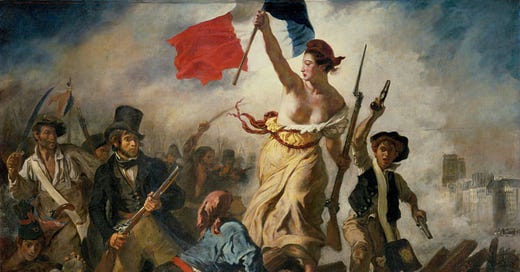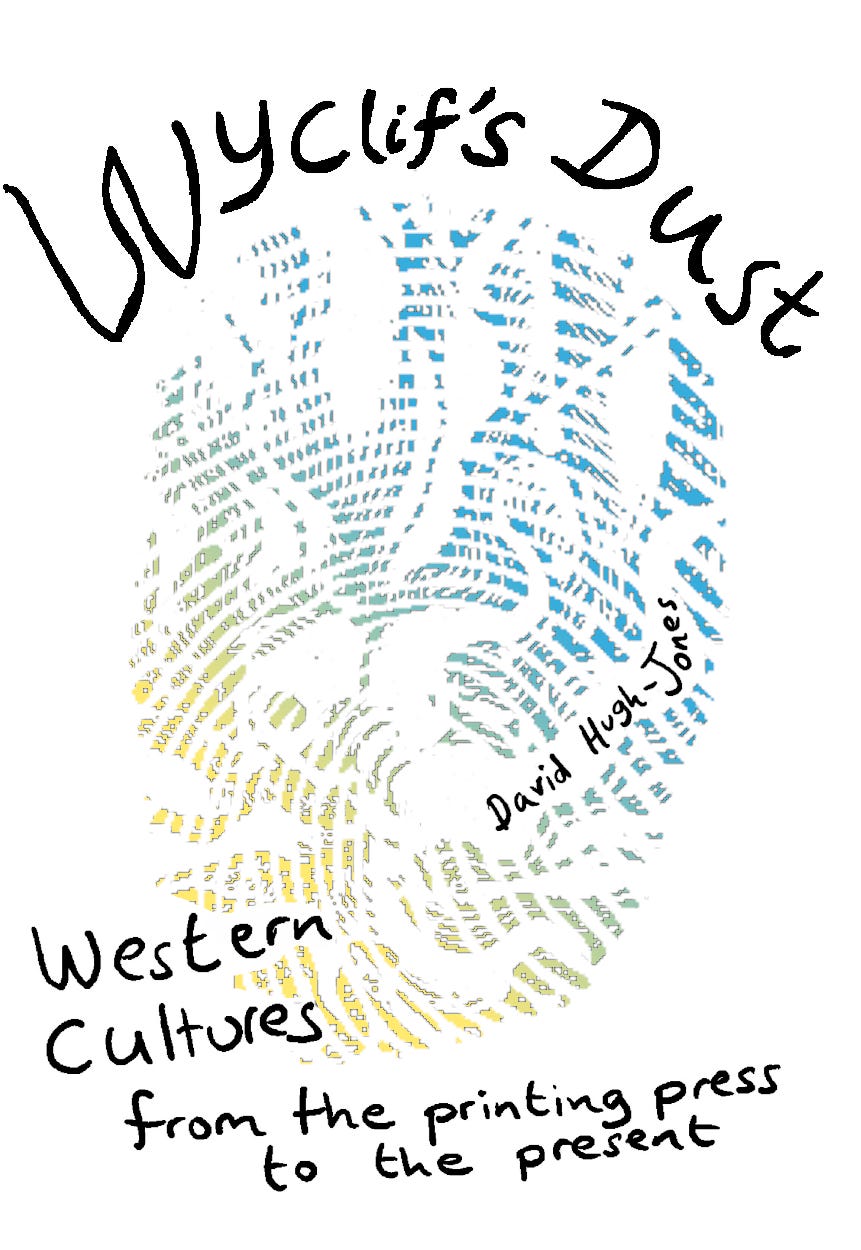This is my fourth article in a tour of the problems facing democracy (previously here, here and here). Before talking about the international situation as promised, I decided to detour into the sphere of ideas. This is a slightly weird thing to do, since in a sense I will be contributing to the thing I am talking about. Having pointed out democracy’s weaknesses, now I’m going to say “you see? Many people think democracy is weak”. Well, how we think society works affects how it does work, that’s just the way it is.
Cracked bells
There are traditionally two big, ringing justifications of democratic decision-making: “democracy implements the people’s will”, and “only democracy lets us be truly free”. Both have long histories, and connect to deep themes of political philosophy. Unfortunately, neither of them really hold up, and nowadays, people who know don’t think they hold up. You may still hear versions of these slogans at campaign rallies, or in high school civics classes. But you will hear them much less in seminar rooms or think tanks. And word gets out from these places sooner or later.
The idea of the people’s will has two critiques. One, from Kenneth Arrow, is that there is no coherent way, starting from a set of individuals with preferences over a set of outcomes, to get to a single set of preferences for the group. The argument is deeply technical, but you can get the flavour from three guys picking a restaurant:
David prefers pizza to Indian to Chinese.
Luke prefers Indian to Chinese to pizza.
Kemal prefers Chinese to pizza to Indian.
If you take votes over each pair of restaurants, you’ll find that a majority prefers pizza to Indian, Indian to Chinese… and Chinese to pizza again, which is incoherent. Arrow generalized this problem and showed that it was very hard to avoid. All the same, theorists are now fairly sanguine that with enough information about what people really want, there are reasonable ways to aggregate preferences. The practical lesson of the Arrow critique is that you can’t naïvely assume that any given institution implements “the people’s will”.
But we can short-circuit this technical discussion, because the second critique, originating from Joseph Schumpeter, says that people don’t have coherent preferences about politics to start with. It is worth citing a long passage:
This reduced sense of reality accounts not only for a reduced sense of responsibility but also for the absence of effective volition. One has one’s phrases, of course, and one’s wishes and daydreams and grumbles: especially, one has one’s likes and dislikes. But ordinarily they do not amount to what we call a will—the psychic counterpart of purposeful responsible action. In fact, for the private citizen musing over national affairs there is no scope for such a will and no task at which it could develop. He is a member of an unworkable committee, the committee of the whole nation, and this is why he expends less disciplined effort on mastering a political problem than he expends on a game of bridge….
Information is plentiful and readily available. But this does not seem to make any difference. Nor should we wonder at it. We need only compare a lawyer’s attitude to his brief and the same lawyer’s attitude to the statements of political fact presented in his newspaper in order to see what is the matter. In the one case the lawyer has qualified for appreciating the relevance of his facts by years of purposeful labor done under the definite stimulus of interest in his professional competence…. In the other case, he has not taken the trouble to qualify; he does not care to absorb the information or to apply to it the canons of criticism he knows so well how to handle; and he is impatient of long or complicated argument…. without the initiative that comes from immediate responsibility, ignorance will persist in the face of masses of information however complete and correct.
The Schumpeter critique is that democracy gives you the people’s whims, not the people’s will. This is “rational ignorance”, one of the best-attested ideas in political science. See Democracy for Realists for the gory details, or my previous post:
How to think about democracy and autocracy in 2023
This is the kind of post that should be an academic paper, but it has a lot of loose threads and uncertainties, and you can’t admit those in a paper. The point is, it isn’t a journalistic comment on how autocracies are doing versus democracies right now, instead, it’s me trying to think through the right “model” to have of democracy versus autocracy. Ho…
The second argument for democracy concerns freedom. Grown-ups should be free to make their own choices, say liberals. Yet in all modern societies, policemen make you obey the law. What justifies this? The democratic response is that, in a famous phrase, “freedom is submission to a self-made law”. If you helped to make the laws, by electing the legislature, then you are obeying not an alien other, but yourself.
It’s an inspiring argument, but something is obviously fishy. What if I voted for the opposition? What if no party offers the legislative program I want? Papering over these gaps is a great employment program for political philosophers. The real reason we don’t mind being made to obey the law is because there is a countervailing benefit: other people have to too. That argument works just as well in non-democracies, which is why rich Westerners happily move to Dubai.
By now, the weaknesses of these arguments are widely understood. Smart people hesitate to invoke them. Where the powerful, intuitive justifications of democracy should be, there is a void.
That absence mostly goes unnoticed, as absences usually do. For a contrast, think back to the 1990s, when Francis Fukuyama reopened the question of whether history has a direction, pointing towards democracy, and when Leonard Cohen could sing “Democracy is coming to the USA” as if it were something that needed not just defending, but perfecting, fully realizing. Go back further to the 19th century to find Marx talking about “the realized mystery of all constitutions”, or Thomas Carlyle describing the turning point in history when George Fox makes himself a suit of leather: democracy as the culmination of a centuries-long process, the arrival of the common man.
Shy defenders, bold critics
No modern academics have thought about politics in more depth than Daron Acemoglu and James Robinson. They regularly produce empirical work supporting the claim that democracy leads to economic growth, a perennial question in political economy since conclusive answers are very hard to come by. Their book Why Nations Fail gathered together a wide range of evidence to produce a global theory of economic history. Their key claims are
1. Politics holds back economic growth. In particular, the insecurity of rulers prevents them from allowing economic innovations that could benefit everyone, because those same innovations might unseat them.
2. Although dictatorships can produce bursts of growth using a given technology, only countries with inclusive political institutions can overcome the ossification of the economy because rulers are threatened by disruptive technological change.
It is a powerful theory, making Joseph Schumpeter wear Karl Marx’s clothes. I just want to note the terminology. You’d think that the pre-eminent actually existing inclusive political institution is democracy. But Why Nations Fail doesn’t phrase it that way. The book talks in the abstract, leaving it unclear exactly which political institutions implement “inclusiveness”. Do Singapore’s, for instance? Clearly, China’s don’t, and Acemoglu and Robinson must be negative on China’s ability to sustain economic growth in the long run without a political transformation. But their reluctance to connect to actual democracy looks like hedging. I think they know that the best current theory and empirics have no explanation of how, or whether, mass elections fulfil the required role.
On the other side of the ledger, critics and skeptics of democracy are articulate. Books like Democracy for Realists, Against Democracy, 10% Less Democracy and The Myth of the Rational Voter, and articles like “Homer Gets A Tax Cut” confidently state the case that voters don’t know what they are doing, that this is bad, and that different policies from those people actually vote for would be better — to the left or the right, according to the author’s prior beliefs.1 Most of these guys do not actively favour the alternatives – they want reforms, not coups. But their support for democracy is tepid at best. “We Only Need Ten Percent Less Of It” is not a cry to sound the tocsin and bring men to the barricades.
Populism
Spreading our net wider, what the broader discourse talks about, since the 2010s, is populism. By a widely accepted definition, this is an ideology that opposes “the people” to “the elites”. Hmm… that sounds quite like a democratic ideology, no? It’s certainly a common rhetorical move. Is a party which calls itself “the political arm of none other than the British people as a whole” populist? (The 1997 New Labour manifesto.) What about “in this country, we rise or fall as one nation; as one people”? (Guess.) In fact, most topic experts think populism is a slippery, even indefinable, concept.

That does not make it meaningless. Donald Trump certainly doesn’t care much about institutional guardrails, so there is a good case for strengthening those guardrails. What is important is that many influential people believe he is a dangerous populist, even a dictator in the making. And obviously the “making” will be via winning a democratic election. In Europe it is the same: elections in many countries are viewed most saliently as posing the risk that nationalists win and betray European security into the hands of Putin. If this is true, we may soon face a nasty conundrum: how can we protect democracy against threats posed by parties with truly mass levels of support, without “destroying it in order to save it”?
Meanwhile, populism is basically a way of talking about your fear of democracy, without saying “I’m afraid of democracy”. Plausibly, when people start to doubt their own long-cherished and long-trumpeted values, they don’t rush to say so explicitly. They just drop the topic, and rephrase themselves in different language.
Ideas have consequences
How do these weaknesses in the world of ideas actually escape into the real world?
Political systems are more like organisms than like perfectible machines. They require constant repair, and they must also evolve to keep pace with changes in technology, the economy and the international environment. This repair and evolution is driven by current ideas. If the ideological environment is broadly sceptical of democracy, you might expect institutions to shift in that direction — adding guardrails, or giving experts more of a role. I’ve written about the opposing dangers of “fire and very slow decay” that threaten existing democracies: takeover by populists, or undermining by elites.
Democracy today is a balancing act between these dangers. To put it another way, in the culture war, each side’s diagnosis is part of the problem. The incumbent elites who want to blame populism, and their challengers who mistrust cultural elites, each have a theory of the other side, and these theories make it harder for them to talk to each other.
In the context of today’s geopolitics, our systems are not just evolving internally; they face rivals who are constantly testing, challenging and evaluating them for weaknesses. Russia’s trolling of Western democracies is of an especially difficult kind, the kind that asks revealing questions. The influence gained by extremists and cranks has obvious, direct bad effects, but it also has a knock-on, indirect effect: it spreads discouragement and despondency about democracy.
A theme of these articles is that conflict is a matter of not just material resources, but of will and collective self-belief. If so, ideas matter. This is what led Roosevelt in World War Two to propose the famous Four Freedoms of religion, of speech, from want and from fear. Conflicts are tests of economic strength and institutional arrangements, but also of belief systems. For a concrete present-day example, is it sustainable for Ukraine to be fighting for its democracy, but for one of its biggest perceived threats to be democratic elections among its backers?
It is a disadvantage to be entering a period of ideological battle without a clear, shared sense of why our side is right. But that is about where we are now. Democratic ideas may yet be renewed and rise to the challenge. That is far from guaranteed, but predicting it accurately is less important than proving it by doing it.
If you enjoyed this, you might like my book Wyclif’s Dust: Western Cultures from the Printing Press to the Present. It’s available from Amazon, and you can read more about it here.
I also write Lapwing, a more intimate newsletter about my family history.







These days when people say "democracy" they really seem to mean, "rule by an interconnected web of institutions, both national, international and non-governmental, with significant input by universities and the media." I.e., rule by credentialed elites. That is why they can say, with a straight face, things like "we need to impose restrictions on speech to save democracy", or "on this election, democracy is on the ballot."
"democracy" means rule by credentialed elites with some token parcipation of the masses via the ballot box.
"populism" is the specter of what happens when the masses get what they want (e.g. stopping immigration, or stopping Western countries from funding wars in the Middle East and with Russia).
That's because what we call democracy is clearly fake. It is not the people actually ruling or making decisions. It is elitist expertocracy.